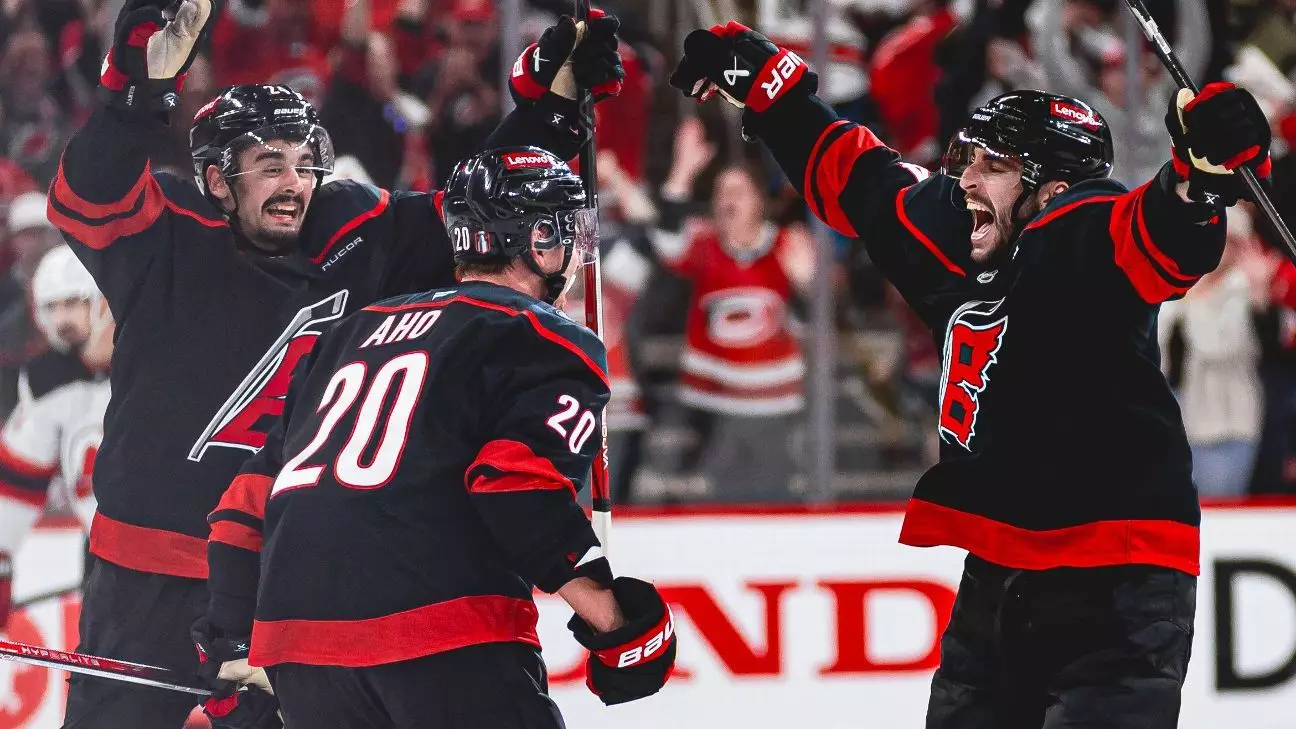After a valiant but ultimately futile fight against the Carolina Hurricanes, the New Jersey Devils found themselves on the wrong side of a heartbreaking defeat in double overtime during Game 5 of their playoff series. Goaltender Jacob Markstrom, visibly distressed after conceding the game-winning goal to Sebastian Aho, expressed his frustration in a dramatic fashion. In a moment that captured the emotional weight of the loss, Markstrom shattered his stick against the goalpost—a visceral display of the agony that comes from a game decided in the dying minutes of overtime.
Markstrom’s performance throughout the game, especially during the overtime periods, was nothing short of extraordinary. His 49 saves were a showcase of skill, and the 35-year-old goalie seemed an impenetrable fortress at times. Hurricanes coach Rod Brind’Amour hailed Markstrom’s efforts, emphasizing how he altered the game’s outcome solely through sheer determination. Yet, Markstrom’s initial struggles, when he let in a few early goals, reminded fans that even the best can be mortal, leaving him with a bittersweet feeling despite an otherwise outstanding performance.
Leading and Losing: The Burden of Expectations
The Bruins’ series encapsulated a complex dilemma faced by the team: how does one reconcile strong individual performance with collective failure? Markstrom’s frustration was compounded by the early 3-0 lead that his team built, which evaporated almost as quickly as it was established. A combination of injuries and lapses in special teams play ultimately proved too much for the squad to bear. The short-lived lead illustrated not only an inconsistent offensive output but also the fragility of momentum in high-stakes scenarios.
The loss of star center Jack Hughes, along with injuries to key defensemen, left the team feeling like a patchwork quilt of players trying to patch up the gaping holes left by absences. The notion of “next man up” is a rallying cry in sports, but it often overlooks the reality that cohesion is paramount in the playoffs. As forward Nico Hischier lamented, despite putting four goals on the board in an elimination game on the road, the results left the Devils with an insatiable feeling.
The Downfall of Special Teams
In the heat of battle, special teams often serve as the undiscussed undercurrent that can either uplift a team or contribute to its downfall. In this series, the Devils’ struggles on the power play were glaring. Failing to convert on 15 opportunities while simultaneously conceding six goals on 19 power plays represented an insurmountable disadvantage. The repetition of their struggles boiled down to individual accountability, as Hischier articulated when he expressed frustration about the team’s inability to capitalize on advantageous situations.
This inherent fragility is often overlooked in the playoffs when narratives highlight individual heroics. But for the Devils, these inefficiencies became a focal point of their downfall. Hockey is a game where the balance of success hinges on special teams executing optimally, and the Devils’ inability to perform in this regard was an albatross hanging around their necks.
A Culture of Resolve Despite Adversity
Despite the palpable disappointment in their playoff exit, a deeper message emerges—one of resilience within the locker room. Markstrom’s reflection on the team’s collective will power serves as a reminder that not all victories are quantifiable in wins and losses. The intensity of their battle, pushing the series to double overtime, speaks volumes to the character of this squad. Players like Timo Meier echoed sentiments that spoke to the spirit of the team despite the very tangible result of elimination.
Professional sports often paint a stark picture of success and failure, but the emotional landscape is far more complex. For the Devils, the experience may serve as a crucible that hardens their resolve for future endeavors. The camaraderie built amidst adversity can be a formidable ally when the next season rolls around, and the lessons learned from such a tightly contested series will be invaluable as they tread on toward improvement.
In reflecting on the series, the Devils’ journey appears fraught, yet layered with growth opportunities. Each playoff series, after all, is a chapter—a learning experience they can leverage for their next campaign. As they regroup, a sense of hope is palpable amidst the disappointment, and only time will tell how deeply this season’s trials will inform their commitment to rise stronger.

